How Can Professional Development Help You?
The Professional Development Course Series at UConn College of Engineering is a transformative program designed to cultivate critical skills such as scientific communication, professional development, and career readiness among graduate students. These 1-credit courses are tailored to address the evolving needs of graduate students across engineering disciplines.
Key Highlights of the Program:
- Core Features:
- Focus on storytelling as a pedagogical tool
- Collaboration with the Center for Career Development and Writing Center
- Peer-based feedback and experiential learning
- Benefits:
- Enhanced public speaking, teaching, and writing skills
- Career competency development aligned with NACE standards
- Networking opportunities across diverse disciplines
The program is supported by institutional collaborations and the dedication of graduate teaching assistants who play a pivotal role in its execution.
Cultivating Scientific Communication Skills through Professional
Development Course Series for the Graduate Curriculum is an Evidence-based full paper submitted to the Graduate Division in ASEE which highlights the importance of our carefully curated Professional Development Courses. You can access and learn more about it here
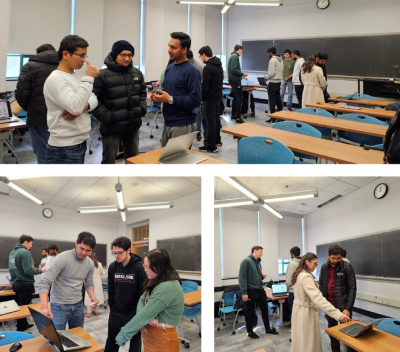
Fall and Spring Courses
ENGR 5450: First Year Experience
ENGR 5450: First Year Experience
When: Fall and Spring Semesters
Who: All first year students
Why: By the end of the course students will be familiar with all the support and opportunities to adjust and thrive at UConn both academically and personally
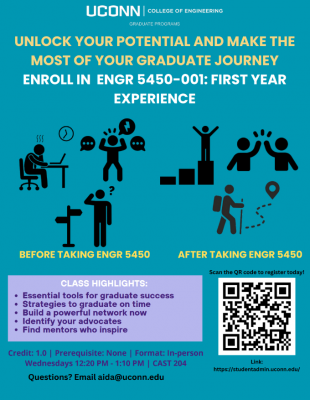
Course Description:
Welcome to UConn Engineering! This First-Year Experience course is your launchpad for thriving as a new graduate student — academically, socially, and personally. In a supportive, interactive setting, you’ll navigate the transition from college or the workforce into grad school life, connect with peers and faculty, and explore the resources that will help you stay healthy, engaged, and on track to graduate. We’ll cover everything from self-advocacy and well-being to mastering the tools, technology, and networks that will fuel your success at UConn and beyond.
Course Objectives:
By the end of the course, participants should be able to:
-
Identify and use academic, technical, social, and cultural resources on campus.
-
Design your Individual Development Plan (IDP) to guide your graduate journey.
-
Engage with cultural and community opportunities at UConn and in the surrounding area.
-
Locate and access physical and mental health support services.
-
Leverage technical and career resources to set yourself up for professional success.
Facilitator:
Aida Ghiaei, Director, Graduate Recruitment, Support and Engagement
Fall Courses
ENGR 5410: Scientific Communication
ENGR 5410: Scientific Communication
When: Fall Semester, every Wednesday 12:00 – 1:00 pm
Who: All second through fifth-year Engineering Graduate Students are eligible to take the course
Why: By the end of the course, students will be able to create effective presentations of their research, write dissertation briefs and posters, and gain experience in public speaking.
Course Description
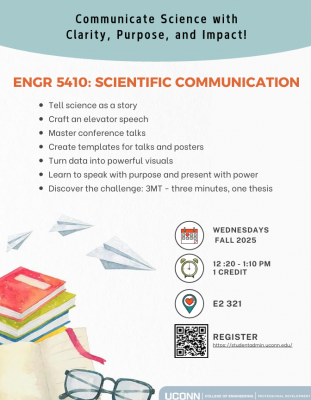 The goal of this course is to formalize the practice and improve professional development skills related to communicating scientific data and research related topics. Topics include: (i) developing the skill to build a story with relevant information to communicate scientific data; (ii) developing the art of public speaking and communicating scientific ideas to the research community and the general public; (iii) creating proper template for presentations, talks or posters; (iv) assessments and feedback for continuous improvement and (v) developing dissertation briefs. The course will also include invited talks and feedback from guest speakers in the field of communication.
The goal of this course is to formalize the practice and improve professional development skills related to communicating scientific data and research related topics. Topics include: (i) developing the skill to build a story with relevant information to communicate scientific data; (ii) developing the art of public speaking and communicating scientific ideas to the research community and the general public; (iii) creating proper template for presentations, talks or posters; (iv) assessments and feedback for continuous improvement and (v) developing dissertation briefs. The course will also include invited talks and feedback from guest speakers in the field of communication.
Course Objectives
By the end of the course, participants should be able to learn and practice presentation skills to communicate scientific data.
- Identify relevant information to build a story around the topic of research
- Work individually and with peers, instructors, and guest lecturers to develop presentations/talks/posters for a scientific community and the general audience
- Practice the art of public speaking to communicate scientific ideas
- Form a cohort/network/community/peer group within the class to support and mentor each other for success and to enhance active participation and build team work.
- Create an effective dissertation brief
- Create an impressive presentation/talk/poster
Facilitators:
Fayekah Assanah, Assistant Professor in Residence, Dept. of Biomedical Engineering, UConn
ENGR 5420: Engineering Internships and Careers in Industry
ENGR 5420: Engineering Internships and Careers in Industry
When: Fall Semester, every Wednesday 3:30 – 4:30 pm
Who: All third, fourth, and fifth-year Engineering Graduate Students are eligible to take the course.
Why: By the end of the course, students will be able to identify 2-4 internship or fellowship opportunities for the following summer to apply. They will learn about personal branding, resumes, cover letters, visas, and work permits.
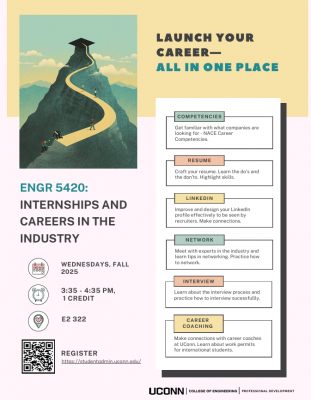
Course Description
Supercharge your engineering career! This hands-on course will help you spot high-value opportunities, craft a standout personal brand, and ace networking and interview situations. You’ll discover internships and fellowships in industry, start-ups, and national labs — and walk away ready to apply with confidence, clarity, and a competitive edge.
Course Objectives
By the end of the course, you will:
-
Identify and target 2–4 internships/job opportunities.
-
Create and refine a high-impact resume, cover letter, and LinkedIn profile.
-
Master and practice networking and interview strategies.
-
Build and leverage a supportive peer network.
-
Navigate and understand visa and work permit processes for international roles.
Facilitator:
Fayekah Assanah, Assistant Professor in Residence, Dept. of Biomedical Engineering, UConn
Aida Ghiaei, Director, Graduate Outreach & Diversity, Vergnano Institute for Inclusion
Jodie LaRosa/span>, Program Assistant, Engineering Graduate Programs
ENGR 5300-012: Special Topics in Scientific Writing
ENGR 5300-012: Special Topics in Scientific Writing
When: Fall Semester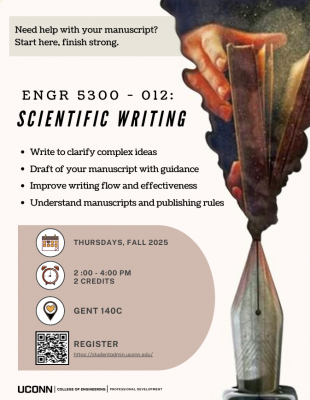
Who: Second- or third-year graduate students, and those with sufficient experimental data for manuscript figures
Why: Essential for graduate students who are transitioning from research to publication.
Course Description:
This course is designed for graduate students engaged in experimental research who are ready to draft a scientific manuscript. The focus is on enhancing scientific writing skills and establishing productive writing habits. Participants will work towards completing a manuscript draft by the end of the semester. The course offers a structured environment to support the writing process and improve the clarity and impact of scientific communication.
Course Objectives:
By the end of the course, participants should be able to:
- Draft a scientific manuscript based on their research.
- Enhance their scientific writing abilities.
- Develop and maintain effective writing habits.
Facilitator:
Fayekah Assanah, Assistant Professor in Residence, Dept. of Biomedical Engineering, UConn
ENGR 5300-011: Special Topics in Engineering Practicum
ENGR 5300-011: Special Topics in Engineering Practicum
When: Fall Semester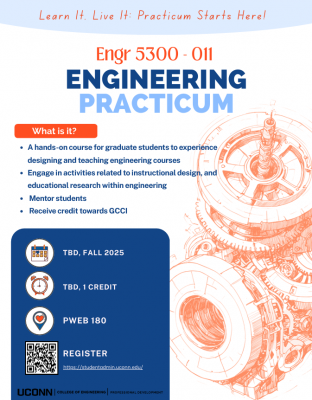
Who: Second - or third-year graduate students
Why: Essential for graduate students aiming to enhance their teaching skills and gain practical experience in academia.
Course Description:
The Engineering Practicum course offers graduate students a unique opportunity to engage in the practical aspects of teaching engineering courses. Students will participate in activities that focus on instructional design and educational research within the engineering field. This experience is invaluable for those looking to pursue careers in academia or educational roles within industry settings.
Course Objectives:
By the end of the course, participants should be able to:
- Design and implement engineering course curricula.
- Engage in educational research and instructional design.
- Mentor undergraduate students effectively.
Facilitator:
Fayekah Assanah, Assistant Professor in Residence, Dept. of Biomedical Engineering, UConn
Spring Courses
ENGR 5430: Teaching Engineering-Communications and Pedagogy
ENGR 5430: Teaching Engineering-Communications and Pedagogy
When: Spring Semester, every Wednesday 3:30 – 4:30 pm
Who: All third, fourth, and fifth-year Engineering Graduate Students are eligible to take the course
Why: By the end of the course, students will learn how to design and develop an engineering course, teaching philosophy, learning objectives, and syllabus. This course also counts as an elective toward the Graduate Certificate of College Instructions (GCCI).
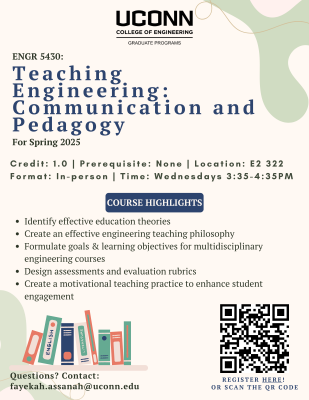
Course Description
The goal of this course is to formalize the practice of professional development skills related to “teaching” (i.e., communication and pedagogy) in settings typically encountered by graduate students in engineering utilizing the foundations of course design, and effective communication strategies.. Topics include: (i) Education Theory, (ii)Teaching Philosophy and Diversity in the classroom, (iii) Instruction Design, (iv) Learning Objectives, (v) Motivating others to learn; (vi) Assessments Basics and (vii) Developing an effective instructional strategy, including methods, modules and assessments to effectively execute instructional learning.
Course Objectives
By the end of the course, participants should be able to:
- Identify effective education theories
- Create an effective engineering teaching philosophy
- Formulate goals and learning objectives for multidisciplinary engineering courses
- Design assessments and evaluation rubrics
- Create a motivational teaching practice to enhance student engagement
- Examine current competencies communication and teaching
- Create and execute a plan for facilitated learning and design a course from the basics that include:
- Establishing course objective(s).
- Motivating audience/students.
- Effective teaching strategies including designing and planning modules.
- Execute activities and course content.
- Plan assessment for the course with real-life scientific problem solving.
Facilitators:
Fayekah Assanah, Assistant Professor in Residence, Dept. of Biomedical Engineering, UConn
ENGR 5300-008: Special Topics in Engineering Practicum
ENGR 5300-008: Special Topics in Engineering Practicum
When: Fall Semester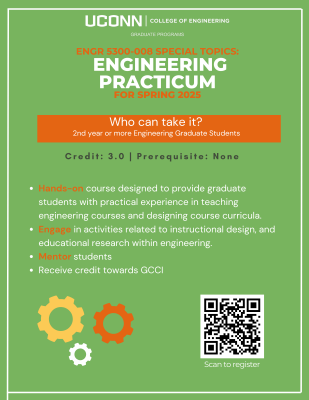
Who: Second - or third-year graduate students
Why: Essential for graduate students aiming to enhance their teaching skills and gain practical experience in academia.
Course Description:
The Engineering Practicum course offers graduate students a unique opportunity to engage in the practical aspects of teaching engineering courses. Students will participate in activities that focus on instructional design and educational research within the engineering field. This experience is invaluable for those looking to pursue careers in academia or educational roles within industry settings.
Course Objectives:
By the end of the course, participants should be able to:
- Design and implement engineering course curricula.
- Engage in educational research and instructional design.
- Mentor undergraduate students effectively.
Facilitator:
Fayekah Assanah, Assistant Professor in Residence, Dept. of Biomedical Engineering, UConn
ENGR 5300-006: Entrepreneurial Skills
 ENGR 5300-006: Entrepreneurial Skills
ENGR 5300-006: Entrepreneurial Skills
When: Spring Semester, every Tuesday 12-1 pm
Who: All Engineering graduate students
Why: By the end of the course, students will learn executive, interpersonal, entrepreneurial skills that will help them in any career path they choose.
Course Description
Take a 1 credit course to learn entrepreneurial skills that are not covered in traditional STEM coursework.
Course Objectives
- Creative Thinking
- Problem Solving
- Ideation
- Communication
- Financial Literacy
- Branding
- Future of Work
- User Experience
Facilitator:
Dr Leila Daneshmandi, Assistant Professor in Residence, Dept. of Biomedical Engineering, UConn
With guest speakers from the entrepreneurship space